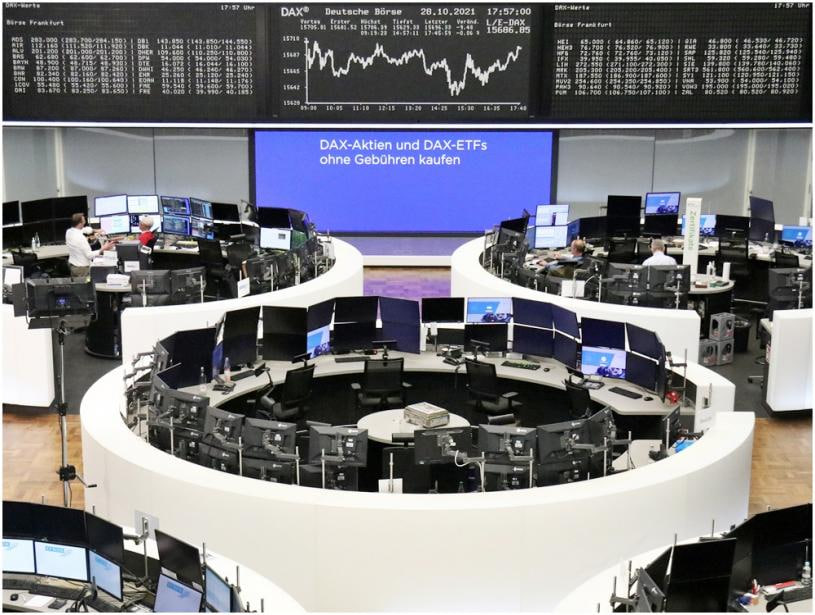Eurozone Inflation: Navigating the Choppy Waters of Monetary Policy – A Deep Dive
Meta Description: Eurozone inflation, ECB monetary policy, IFO survey, inflation forecasts, economic outlook, interest rates, price stability, German economy, Austrian economy, French economy. Unlock expert insights into the current state of Eurozone inflation and the ECB's response.
Introduction:
Whoa, hold onto your hats! The Eurozone economy is currently navigating a complex and, frankly, somewhat turbulent sea of inflation. Recent surveys paint a picture that's far from rosy, with predictions suggesting that inflation might stubbornly refuse to cooperate and return to the European Central Bank's (ECB) target of 2%. This isn't just some academic exercise; it directly impacts your wallet, your job security, and the overall economic health of the Eurozone. Let's dive deep into the latest data, expert opinions, and what it all means for you and me. We'll slice and dice the information, giving you a clear and concise understanding of the situation, free from complicated jargon. Buckle up, because it's going to be a ride!
The IFO Survey: A Red Flag for the ECB?
The recent IFO survey, a collaboration between the IFO Institute and the Swiss Institute for Economic Policy, has sent ripples through the financial markets. Their findings? Economists are predicting that Eurozone inflation will stubbornly hover above the ECB's 2% target for the foreseeable future. Specifically, they're forecasting a 2.6% inflation rate for the Eurozone this year. That's not great, folks. Looking at individual countries, the picture isn't much brighter: Germany is projected at 2.4%, Austria at a slightly higher 3.1%, and France at 2.3%. These numbers paint a rather concerning picture, particularly given the ongoing pressure on household budgets across Europe. What does this mean for the average citizen? Higher prices for everyday goods, a potential squeeze on disposable income, and a general sense of economic uncertainty.
The IFO's Niklas Potrafke summed it up perfectly: "Mid-term, inflation is expected to remain above the ECB's 2% target." This is a direct challenge to the ECB's efforts to control inflation and stabilize the Eurozone economy. The survey's implication that "inflation expectations are stagnant" is particularly troubling, suggesting that the current measures might not be sufficient. This underlines the complexity of the situation.
ECB's Tightrope Walk: Interest Rates and Monetary Policy
The ECB is currently facing a tough call. While the market broadly anticipates further interest rate cuts, the IFO survey casts a shadow of doubt on the effectiveness of such a move. The stagnant inflation expectations highlight a potential risk: further rate cuts might not significantly impact inflation, while simultaneously risking a potential increase in inflation. It's a delicate balancing act, a tightrope walk between stimulating economic growth and keeping inflation under control. ECB President Christine Lagarde has emphasized that any decisions will be data-driven, reflecting confidence (or lack thereof) in inflation's downward trajectory. The situation is far from straightforward, and any action taken by the ECB will carry significant implications.
It's worth noting that the ECB's monetary policy isn't a magic wand. It operates within a complex web of global and regional economic forces. Geopolitical instability, energy price fluctuations, and supply chain disruptions all play a role in influencing inflation. The ECB's effectiveness in controlling inflation depends on how effectively it can navigate these external factors.
Understanding the Dynamics of Inflation: A Deep Dive
Inflation isn't just a number; it's a multifaceted phenomenon driven by a variety of factors. Let's break it down:
| Factor | Impact on Inflation | Example |
|--------------------------|---------------------------------------------------|----------------------------------------------|
| Demand-Pull Inflation | Increased consumer demand drives up prices | High consumer spending during economic booms |
| Cost-Push Inflation | Rising production costs increase prices | Increased energy prices due to global events |
| Built-in Inflation | Wage increases lead to higher prices | Unions negotiating higher wages |
| Imported Inflation | Price increases in imported goods | Higher prices for oil imported from OPEC |
| Government Policies | Fiscal and monetary policies influence inflation | Tax increases or government spending cuts |
Understanding these dynamics is crucial for grasping the complexity of the current situation in the Eurozone. It isn't simply a case of one factor; rather, it's a complex interplay of various economic forces impacting inflation.
Beyond the Numbers: The Human Impact of Inflation
The impact of inflation isn't just felt in economic statistics; it's a lived experience for millions across the Eurozone. Higher prices for food, housing, and energy directly affect household budgets, particularly for those with lower incomes. This can lead to reduced consumption, decreased savings, and increased financial stress. It can also contribute to social inequality and political instability. The human cost of persistent inflation is significant and often overlooked amidst discussions of economic policy.
Frequently Asked Questions (FAQ):
-
Q: What is the ECB's target inflation rate? A: The ECB aims for a medium-term inflation rate of 2% for the Eurozone.
-
Q: Why is inflation so high right now? A: A combination of factors, including supply chain disruptions, energy price shocks, and strong consumer demand post-pandemic, are contributing to elevated inflation.
-
Q: What tools does the ECB have to control inflation? A: The ECB primarily uses interest rate adjustments and quantitative easing (buying government bonds) to influence inflation.
-
Q: What does the IFO survey suggest about the ECB's future actions? A: The survey suggests that the ECB might face challenges in bringing inflation down to its target, possibly making further interest rate cuts less effective.
-
Q: How does inflation affect ordinary people? A: Inflation erodes purchasing power, leading to higher prices for everyday goods and services, impacting household budgets and potentially increasing poverty rates.
-
Q: What are the potential long-term consequences of persistent high inflation? A: Prolonged high inflation can result in economic instability, reduced investment, and decreased economic growth.
Conclusion:
The Eurozone's inflationary pressures are a significant challenge. The IFO survey's findings add to the complexity, highlighting the potential for inflation to remain above the ECB's target in the medium term. The ECB's upcoming monetary policy decision will be crucial in shaping the economic outlook for the Eurozone. It's a situation that demands careful monitoring and a nuanced approach to policymaking. The coming months will be critical in determining the effectiveness of the ECB's strategies and the ultimate impact on the Eurozone's economic trajectory. The road ahead isn't easy, but by understanding the intricacies of the economic landscape, we can better navigate the challenges ahead. Stay informed, stay vigilant, and be prepared for what the future may hold.



